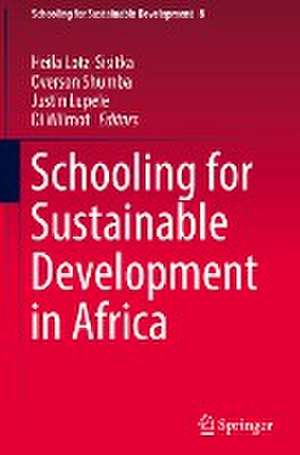Schooling for Sustainable Development in Africa: Schooling for Sustainable Development, cartea 8
Editat de Heila Lotz-Sisitka, Overson Shumba, Justin Lupele, Di Wilmoten Limba Engleză Hardback – 16 dec 2016
| Toate formatele și edițiile | Preț | Express |
|---|---|---|
| Paperback (1) | 560.31 lei 38-44 zile | |
| Springer International Publishing – 7 iul 2018 | 560.31 lei 38-44 zile | |
| Hardback (1) | 575.51 lei 38-44 zile | |
| Springer International Publishing – 16 dec 2016 | 575.51 lei 38-44 zile |
Preț: 575.51 lei
Preț vechi: 719.38 lei
-20% Nou
Puncte Express: 863
Preț estimativ în valută:
110.12€ • 115.39$ • 91.04£
110.12€ • 115.39$ • 91.04£
Carte tipărită la comandă
Livrare economică 08-14 aprilie
Preluare comenzi: 021 569.72.76
Specificații
ISBN-13: 9783319459875
ISBN-10: 3319459872
Pagini: 320
Ilustrații: XVII, 289 p. 29 illus., 18 illus. in color.
Dimensiuni: 155 x 235 mm
Greutate: 0.66 kg
Ediția:1st ed. 2017
Editura: Springer International Publishing
Colecția Springer
Seria Schooling for Sustainable Development
Locul publicării:Cham, Switzerland
ISBN-10: 3319459872
Pagini: 320
Ilustrații: XVII, 289 p. 29 illus., 18 illus. in color.
Dimensiuni: 155 x 235 mm
Greutate: 0.66 kg
Ediția:1st ed. 2017
Editura: Springer International Publishing
Colecția Springer
Seria Schooling for Sustainable Development
Locul publicării:Cham, Switzerland
Cuprins
Part 1. Orientation to Education for Sustainable Development and Schools in Africa and Education for Sustainable Development Learning Processes.- 1. Education for Sustainable Development, Learning and Quality Education in Africa – Learning Today for Tomorrow.- 2. Situated Learning in relation to Human Conduct and Social-Ecological Change.- 3. Deliberations on a Changing Curriculum Landscape and Emergent Environmental and Sustainability Education Practices in South Africa.- Part 2. Curriculum Innovations: Teaching, Learning and Assessment.- 4. The Relation of Mainstreamed Environmental Education to the Modern Schooling System in Zambia.- 5. The Culture Hut Concept as Curriculum Innovation: Engaging the Dialectic Nature of Heritage in Zimbabwean Schools to Support ESD Learning.- 6. Integrating Afrocentric Approaches for Meaningful Learning of Science Concepts.- 7. The Uptake of Education for Sustainable Development in Geography Curricula in South African Secondary Schools.- 8. Educationfor Sustainable Development in the Namibian Biology Curriculum.- 9. Developing Problem-Based Learning Approaches to Water Education in Mauritius.- 10. Issues-based Enquiry – an Enabling Pedagogy for ESD in Teacher Education and School Geography.- Part 3. Integrated Approaches to Education for Sustainable Development in Schools.- 11. Integrating School-Community Concerns in Framing ESD and Educational Quality.- 12. Integrating Learners' Voices into School Environmental Management Practices through Dialogue.- 3. Improving the Quality of Education through Partnerships, Participation and Whole School Development: A Case of the WASH Project in Zambia.- Part 4. Teachers and Teacher Education.- 14. Learning as Connection: Pedagogical Innovations to Support ESD Learning Processes in Science Teacher Education Settings.- 15. Strengthening Teachers’ Knowledge and Practices through a Biodiversity Education Professional Development Programme.- 16. Educational Quality and the Introduction of New Teaching Methods into Teacher Education.- 17. Reflecting on Innovative ESD Initiatives in the Context of Teacher Education in Lesotho.- 18. Enhancing Agency and Action in Teacher Education in Zimbabwe.- 19. Towards Professional Learning Communities: A Review.- 20. Development of ‘Fundisana Online’: An ESD E-Learning Programme for Teacher Education.
Textul de pe ultima copertă
This book considers the scope and dynamics of Education for Sustainable Development (ESD) and learning in schools in Africa. It explores the conditions and processes that support such learning, and examines how ESD in schooling can improve the quality and relevance of education. The quality of education has been defined internationally as a key concern for educational institutions around the world, including schools in Africa. The models of quality are often limited to performance-based approaches and/or inclusive approaches. The contributions in this book show that there is more to a discussion on educational quality in Africa thanperformance success and/or inclusion. The chapters explain how ESD brings a new relevance to education in Africa, and at the same time, sounds the beginning of a new concept of quality education. The volume presents a collection of experiences in creating and supporting quality learning processes through a variety of ESD practices.
Caracteristici
Profiles some of what is known about ESD and quality teaching and learning in African schooling teacher education in Africa Foregrounds specific dynamics, such as curriculum, teaching and learning approaches, as well as the more integrated dynamics of ESD Shows that ‘learning as connection’ is key to improved quality and relevance of education in Africa Pays attention to issues of context and history, policy and







